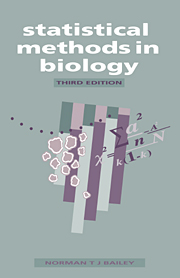Book contents
- Frontmatter
- Contents
- Preface
- 1 Introduction
- 2 Variability and frequency distributions
- 3 Estimation, standard errors and confidence limits
- 4 The basic idea of a significance test
- 5 Simple significance tests based on the normal distribution
- 6 The use of t-tests for small samples
- 7 Contingency tables and χ2
- 8 χ2-tests of goodness-of-fit and homogeneity
- 9 The correlation of measurements
- 10 Regression analysis
- 11 Simple experimental design and the analysis of variance
- 12 Introduction to factorial experiments
- 13 Random samples and random numbers
- 14 Partial correlation and multiple regression
- 15 Non-parametric and distribution-free tests
- 16 Notes on numerical calculation, calculators and computers
- Suggestions for more advanced reading
- Summary of statistical formulae
- Appendix tables
- Index
- Frontmatter
- Contents
- Preface
- 1 Introduction
- 2 Variability and frequency distributions
- 3 Estimation, standard errors and confidence limits
- 4 The basic idea of a significance test
- 5 Simple significance tests based on the normal distribution
- 6 The use of t-tests for small samples
- 7 Contingency tables and χ2
- 8 χ2-tests of goodness-of-fit and homogeneity
- 9 The correlation of measurements
- 10 Regression analysis
- 11 Simple experimental design and the analysis of variance
- 12 Introduction to factorial experiments
- 13 Random samples and random numbers
- 14 Partial correlation and multiple regression
- 15 Non-parametric and distribution-free tests
- 16 Notes on numerical calculation, calculators and computers
- Suggestions for more advanced reading
- Summary of statistical formulae
- Appendix tables
- Index
Summary
The subject-matter of the biological and medical sciences is remarkable for its richness and complexity. Moreover, the wide range of variation observed in both organisms and their environments is frequently analysable into simpler components only with great difficulty. Suppose we want to compare the behaviour of two different animal populations. Not only does each population consist of individuals differing amongst themselves with regard to factors like sex, age, physical measurements, coloration, susceptibility to disease, aggressiveness, etc., but the patterns of behaviour in which we are interested may themselves be fairly complicated. For these reasons, much biological work tends to be comparatively quantitative in nature. In the more exact sciences of physics and chemistry, on the other hand, we find that irreducible variation is usually fairly small, and often consists of little more than experimental errors. The latter can, as a rule, be virtually eliminated by averaging over several repeated determinations.
In biological sciences, therefore, inherent variation must be accepted as basic, and must be handled as such. This certainly makes numerical arguments more difficult. We may talk about the average number of eggs laid by a certain species of bird under particular environmental conditions or the proportion of subjects protected by an immunising vaccine. But these average figures conceal the fact that specific instances may easily show very different results. Some females will produce very large clutches, others will not lay at all.
Information
- Type
- Chapter
- Information
- Statistical Methods in Biology , pp. 1 - 6Publisher: Cambridge University PressPrint publication year: 1995
Accessibility standard: Unknown
Why this information is here
This section outlines the accessibility features of this content - including support for screen readers, full keyboard navigation and high-contrast display options. This may not be relevant for you.Accessibility Information
- 1
- Cited by
